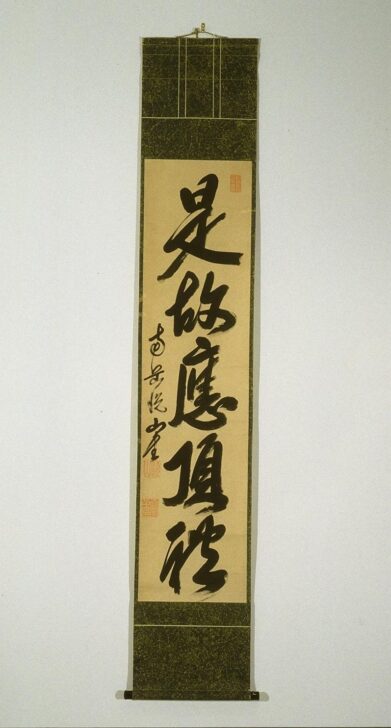“Heads should be bowed to him,” quotation from the Avalokitesvara Sutra
Yueshan Daozong (J. Etsuzan Dôshû; Ôbaku Etsuzan)

Description
Yueshan Daozong
China, 1629–1709
Heads Should Be Bowed to Him
Edo period (1615–1868)
ca. 1660–1709
Hanging scroll, ink on paper
Gift of Marvin Eisenberg in tribute to Richard and Vee Tsung Ling
Edwards, 1999/1.105
In traditional China, calligraphy was regarded as the highest of the
arts because it was held to be the truest reflection of one’s character.
For Chinese and Japanese Zen Buddhist monks, who absorbed
much of Chinese literati (amateur scholar-artist) culture, calligraphy
could thus be a form of self-portraiture. The disciples and lay
followers of prominent Zen teachers such as Yueshan Daozong
(Japanese name: Etsuzan Doshu or Obaku Etsuzan), a Chinese monk
and renowned calligrapher who eventually became the abbot of
an important monastery in Japan, would request samples of his
writing, and hanging scrolls with edifying phrases, such as this one,
were produced by the thousands to satisfy the demand.
The phrase in this calligraphy is from the last section of the
Buddhist scripture known as the Avalokitesvara Sutra:
Equipped with all blessings, Viewing all with compassionate eyes, His ocean
of accumulated blessings is immeasurable. Heads should be bowed to him.
Spring/Summer 2021 Gallery Rotation
__________
Gallery Rotation Winter 2014
Yueshan Daozong (Ôbaku Etsuzan)
China, 1629–1709
“Heads should be bowed to him,” from the Avalokitesvara Sutra
Edo period (1615–1868)
circa 1660–1709
Hanging scroll, ink on paper
Gift of Marvin Eisenberg in tribute to Richard and Vee Tsung Ling Edwards,
1999/1.105
Yueshan Daozong was renowned in his day as a calligrapher, regarded in traditional China as the highest of the arts because it was held to be the truest reflection of one’s character. To do calligraphy well required many years of disciplined practice and study of the great works of earlier masters. For Chinese and Japanese Zen monks, who absorbed much of Chinese literati (amateur scholar-artist) culture, calligraphy could thus be a form of self-portraiture. The disciples and lay followers of a prominent Zen teacher would request samples of his writing, and hanging scrolls with edifying phrases, such as this one, were produced by the thousands to satisfy the demand. A native of Fujian province in southeast China, Yueshan took full monastic vows at the age of twenty-two, eventually immigrating to Japan (where he was known as Etsuzan, the Japanese pronunciation of his name) and becoming the abbot of an important monastery. The phrase in this calligraphy is from the last section of the Buddhist scripture known as the Avalokitesvara Sutra:
Equipped with all blessings, Viewing all with compassionate eyes, His ocean of accumulated blessings is immeasurable. Heads should be bowed to him.
Subject Matter:
Translated as "Equipped with all blessings, Viewing all with compassionate eyes, His ocean of accumulated blessings is immeasurable. Heads should be bowed to him." from the Avalokitesvara Sutra. Avalokitesvara is one of the main bodhisattvas in Mahayana Buddhism.
Physical Description:
Long calligraphy hanging scroll with green colored backing. Calligraphy paper is faded. Black ink. Stamps in red in the top right corner and near the bottom on the left. A smaller font of calligraphy is set on the left side while the larger set of calligraphy takes up the center of the scroll.
Usage Rights:
If you are interested in using an image for a publication, please visit https://umma.umich.edu/request-image/ for more information and to fill out the online Image Rights and Reproductions Request Form.